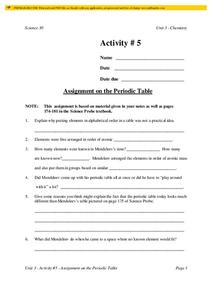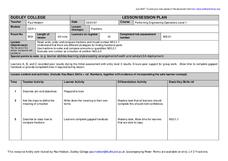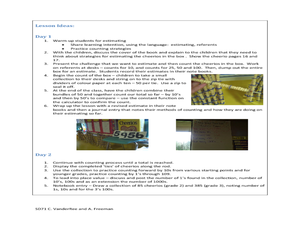Curated OER
Prime Time
Seventh graders practice determining the prime factorization of composite numbers. They create Christmas factor trees for prime numbers greater than 100. They decorate their final products with markers, crayons, colored pencils, glitter...
Curated OER
George and Sam Save for a Present
Third graders develop their algebraic thinking by recognizing a variety of patterns using concrete objects, numbers, tables, and pictures. In this George and Sam Save for a present lesson, 3rd graders communicate their mathematical...
Curated OER
Equal Shmequal by Virginia Kroll
Pupils read a book and complete exercises to explore the meaning of 'equals.' In this equal numbers lesson, students brainstorm the meaning of equals and read a story about the topic. Pupils use manipulatives to study balance and equal...
Curated OER
Equivalent Fraction Munch with Pizza Pie
Students demonstrate fractions and mixed numbers using concrete pictorial models of pizza. They relate symbols to the models.
Curated OER
Periodic Table
In this periodic table worksheet, students determine why the periodic table is organized the way it is and compare and contrast the characteristics of the different grouping of elements. This worksheet has 22 short answer and 36 fill in...
Curated OER
Finding PI
Students select and use appropriate operations, methods and tools to compute or estimate using whole numbers. They develop and use formulas for determining the circumference and area of circles. Students determine and describe the...
Curated OER
Electromagnetic Spectrum
In this electromagnetic spectrum worksheet, students review all regions of the spectrum in order from longest to shortest wavelength. Students list all possible values for specific quantum numbers. This worksheet has 20 problems to solve.
Curated OER
Sub-Atomic Particles and Energy
In this atomic particles worksheet, students complete an elements chart comparing atomic number, mass number, protons, neutrons, and electrons. Students write the electron configuration for atoms. This worksheet has 1 graphic organizer...
Curated OER
Which Decimal Is Larger?
In this on-line math instructional activity, students complete 10 multiple choice questions where they choose the larger or smaller of two decimals. Students can check their answers at the end of the instructional activity.
Curated OER
Value Your Digits
Third graders work with place value. In this place value lesson, 3rd graders write three digit numbers and tell the place value of each number. They compare numbers and money, regroup, discuss the value of coins, and count money.
Curated OER
How to Make Invisible Ink
Students learn how to make two types of invisible ink. In this invisible ink lesson plan, students will make two types of invisible ink using common house hold items. They will then write a paper comparing and contrasting each type of ink.
Curated OER
Problem Solving: Use Equations for Comparison Problems
In this writing equations for comparison word problems worksheet, students use a as the variable in equations, compare numbers, and solve. Students solve six problems.
Curated OER
Fractions
In this mathematics worksheet, students read, write, order and compare fractions and mixed numbers. They identify that there are various strategies for finding fractional parts and use fractions to order and compare amounts or quantities.
Curated OER
Subtracting Whole Numbers and Decimals
In this math worksheet, students learn to subtract whole numbers and decimals. Students are given step by step directions on how to solve one sample problem, then complete 5 examples on their own. Example: 6.57 - 3.28. There is...
Curated OER
Find Minimum and Maximum
In this math worksheet, students analyze 24 groups of 6 numbers each. Students write the minimum number and the maximum number in each set. There are no examples; it appears that students are to write the biggest and smallest numbers in...
Curated OER
Book Title: Great Estimations
Explore estimation with your math class. They will estimate how many Cheerios are in a box. Then count and group 50 Cheerios on a twist tie and attach groups to represent hundreds. They then discuss and practice skip counting and revise...
Curated OER
Fraction - Subtracting Unlike Denominators
These presentations by Monica Yuskaitis are particularly good. In this one, she shows viewers how to deal with subtracting fractions that have unlike denominator, no small task! This is a tricky process, and this PowerPoint takes young...
State of Michigan
Pre-K Mathematics
Kick-start children's education with this pre-school math unit. Offering 31 different hands-on learning activities that develop young mathematicians' pattern and shape recognition, basic number sense, and much more, this is a must-have...
Curated OER
Fractions: Jim and John
Elementary and secondary learners investigate various concepts related to the study of fractions. They use word problems during the introduction to parts of a fraction and proceed to some of the basic operations of using fractions. The...
Curated OER
Math: Greater Than, Less Than, Equals
Elementary schoolers learn about using the symbols for greater than, less than and equal to. They answer nine questions using the information they learned. The answers are on the last page of the packet.
Curated OER
Narrow it Down: Numbers
Elementary learners of all ages utilize their number knowledge by playing a 20 questions style game. They participate in a game in which they ask yes or no questions to a group leader in order to discover which number the leader has...
Curated OER
Choose a Graph to Display Data
For this math graphs worksheet, learners write line plot, tally chart, pictograph, or bar graph to tell the best kind of graph to use to answer the six questions.
Pennsylvania Department of Education
Comparing Sets
Students count back with cubes to model subtraction problems. In this subtraction lesson plan, students compare sets of problems and record their results in a table.
Curated OER
Compare and Arrange Whole Numbers Up to 100
Number whizzes investigate integers by arranging them in a specific order. They utilize whole numbers which are given to them and then put them in order up to 100. They also practice using "greater than" or "lesser than" symbols.

























